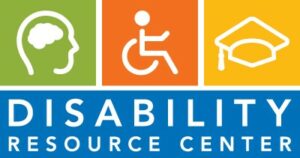If you have questions about the differences about having an Individualized Education Plan (IEP) or 504 Plan, we recommend reviewing this page, and asking for more information in your Access Meeting with the DRC so.
Kindergarten through High School
- Education is a right and must be provided to all.
- The school district is responsible for identifying a student’s disability.
- The school district provides free testing, evaluation and transportation.
- Transition planning and timelines exist to clarify students’ vision, identify programming choices and coordinate appropriate coursework options.
- The school district develops an IEP to define educational supports and services under special education
- The IEP team, including the student, determines was supports and services will be provided.
- Access to general curriculum, necessary modifications, and a variety of appropriate accommodations are available.
- Assignments may be reduced and extra time allowed to complete work.
- Personal services for medical or physical disabilities are required.
- Class is usually a semester or 90 days.
- Students may take the same subject all year.
- The main office exists as the center of activity for the school.
- There is a rigid schedule with constant supervision.
- Classes meet daily and therefore there is daily contact with teachers and support staff.
- Attendance is taken.
- Missing classes for various reasons is permissible and you may still complete the class.
- Guidance counselors or other staff schedule support services for students.
- Someone is available to help plan study time (teachers, Special Education staff, parents).
- Classes are generally held in one building.
- Average class time is 35-45 minutes.
- Teachers closely monitor a students’ progress.
- Parent permission is required until 18 years of age for all special education and accommodation planning.
Higher Education
- Education is not a right. Students must meet admission criteria.
- Students must self-identify in college if they want accommodations.
- Students must provide current and appropriate documentation. If documentation from high school is not deemed adequate, the student pays for additional evaluation and testing.
- Student make course selections with some assistance from advisers or instructors.
- There is no IEP or special education in college – only academic accommodations based on individual need and ensuring equal access.
- The DRC determines accommodations in a discussion with the student and the student may be responsible for contacting faculty for some services. The DRC will assist students in this if necessary and may advocate for students in disability-related situations.
- No fundamental alterations to the curriculum are made. Academic accommodations and modifications are available based on individual student’s documented disability. Any change to a course which would fundamentally alter the essential elements of the course is not required.
- Everyone is required to turn in complete assignments on time and do the same amount of work.
- No personal services, such as tutoring, personal aides, etc. are required.
- Bellevue College operates on a quarter system and meets approximately 53-55 days.
- Students have new classes every quarter and new textbooks.
- There are a variety of offices that specialize in an aspect of school (e.g. financial aid, enrollment, advising, etc.) and these offices are located in different locations on campus.
- Students have greater flexibility of scheduling and there is little to no supervision.
- Classes meet 1 to 5 times a week. Certain classes meet only 3-5 times per the entire quarter. Therefore instructors may not monitor a student’s progress but will grade based upon the student’s work and may or may not make an effort to discuss a student’s performance in spite of failing scores.
- Attendance policies are at the discretion of the instructors.
- Missing classes may result in lowered grades or failing the class.
- Students must connect with the DRC to coordinate and arrange all support services.
- Students are responsible for setting and following through on all scheduling and study time.
- Classes are held at many locations on campus, and may meet off-campus on occasion.
- Class times range from 50 minutes to 4 hours.
- Even if a student is not 18, they are considered an adult with all the decision-making authority. Parent permission is not required and generally the college cannot discuss with parents any of the student’s information without permission from the student.
Further information can be found on the Office of Civil Rights webpage. We look forward to meeting you and discussing any questions you have about these differences and how you can give yourself the best chance to be successful here at Bellevue College!
Last Updated September 14, 2022
